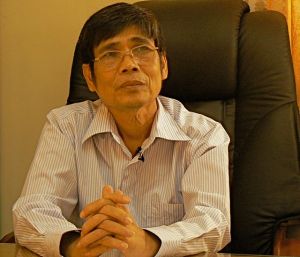Dr. Char Meng Chuor: ‘We Need Community Support to Eliminate Malaria’
CONTAINMENT recently spoke to Dr. Char Meng Chuor the new Director of the National Center for Parasitology, Entomology and Malaria Control (CNM).

Dr. Char Meng Chuor. Pix by WHO/sonny krishnan
One big concern is malaria on the move. How important is the role of village malaria workers or VMWs in the early diagnosis and treatment of mobile migrant workers?
Yes, indeed, malaria on the move among mobile migrant workers is worrying. But first let me clarify one thing on terminology. I like to refer to the village malaria workers as community health workers because they can also work on other diseases at the community-level. At present in each health centers there are only seven to eight full-time health staff as first-line health workers. And as you know most of the villages are far from the health centers. So we need these community health workers to support the work of the health centers.
When Khmer people fall sick, they end to seek treatment from the nearest source available to them. And most often, these community health workers are nearest to them. For that reason they are so important in the fight to contain multi-drug resistant malaria. These community health workers not only carry out early diagnosis and treatment, but they also provide vital information to the mobile migrant workers on how they can protect themselves against malaria.
 Counterfeit and substandard anti-malarials are one of the causes for the emergence of MDR-falciparum malaria. What are the efforts to eliminate these counterfeit and substandard drugs sold by the private sector and also enforce the ban on oral artemisinin monotheraphy?
Counterfeit and substandard anti-malarials are one of the causes for the emergence of MDR-falciparum malaria. What are the efforts to eliminate these counterfeit and substandard drugs sold by the private sector and also enforce the ban on oral artemisinin monotheraphy?
First of all, we have to ensure that communities must have access to genuine medicines. This is essential. We can ban oral monotherapies, but if sick people do not know where to get effective anti-malarials, we will go back to square one. Secondly I need to emphasize the importance of law enforcement. The elimination of malaria by 2025 is a government priority and so it’s important that legislation is in place for the law enforcers to start the crackdown of counterfeit malaria medicines.
But let us not forget that we have to also work with the private sector through partnerships. We are now drafting the strategy for the public-private mix, in terms of malaria. We’re still in the learning process, when it comes to dealing with the private sector. But there’s a lot of donor goodwill to provide technical assistance. The chink in the armour is the private sector because most Khmers when they fall sick go to the pharmacies or drug stores first. We have to convince the private sector on why they need to be good and responsible providers to prevent a public health emergency that could cross borders.
What are the lessons learnt from the Containment Project, and how can these lessons be used as we move from malaria control to elimination?
CNM has been implementing the containment project since January 2009, and we have many lessons to share. The first and most important lesson is that it is possible to reduce malaria incidence in the target zones through good management and implementation of proven strategies in malaria control, such as high-level coverage of long-lasting insecticide treated bed nets, provision of free diagnosis and treatment at the community level, and engagement of the community through malaria education and awareness programs. CNM, through the support of the Bill and Melinda Gates Foundation and the assistance of technical partners such as WHO, Institute Pasteur and Malaria Consortium, and others, has helped us achieve this.
We have also found that, when malaria cases begin to decrease, the role of systematic gathering of health information, including malaria surveillance and response becomes very important. As malaria cases decrease in Cambodia and we are on our path towards elimination, we need to strengthen surveillance systems to capture information on cases up to the village level, and also concentrate on responding to increases in cases through distribution of bed nets and indoor residual spraying.
Another lesson learned is the need to engage and work closely with the private sector in order to be informed of those malaria cases treated by the private sector, in pharmacies and private clinics, and to provide incentives to the private sector to help in the fight against the sale and manufacture of artemisinin monotherapies, as well as fake and substandard drugs.
Also, we need to be sure to have the full support and participation of communities in the fight against artemisinin-resistant malaria, and also move towards elimination. This can be facilitated through wide-ranging media awareness campaigns, community mobilization through local community organizations and distribution of information, education and communication materials, as well as advocacy by involved leaders and authorities.
Leave a comment